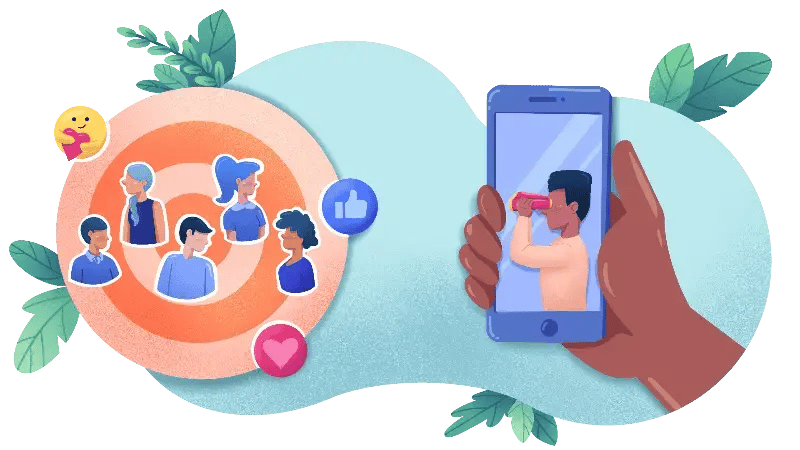How to Define Your Buyer Personas for Law Firms
Whether you're building a new website and online presence for your law firm or revamping an older website that desperately needs an update, you should be thinking about various ways you'll bring traffic to your website. Doing so will help you attract potential clients to your law firm.
If you're still getting familiar with online marketing for law firms, there are some terms and ideas you might not know. One of those is the "buyer persona." While you might consider your potential legal clients as "buyers" or "customers," the term can help you think through how to design your website, practice area pages, and blog content with specific types of readers in mind.

In other words, focusing on the idea of the "buyer persona" for your law firm can provide you with a better understanding of who might be landing on your website or reading your blogs and, ultimately, how you can get those people to take the next step in contacting your law firm for possible representation.
Why Buyer Personas Matter
Law firms are businesses. Although they're offering services that are certainly distinct from other partnerships, LLCs, and corporations, law firms are still businesses that need to consider clients' interests and needs to be successful. Similarly, like other businesses that provide varied services, law firms must market themselves to potential "buyers" (i.e., clients) to keep the firm running. And, of course, not unlike other businesses, law firms need to gain the trust of clients to continue attracting new clients and to demonstrate to other legal practitioners that they're providing valuable services to their communities.
We're not suggesting that law firms necessarily have anything in common with, for example, art galleries in the same area of town. What we are saying, however, is that, regardless of the content of your business, it can be helpful to use business marketing language to develop the most effective strategies for marketing your business. For a law firm, you can find much value in thinking about your "buyer personas."
So, what are buyer personas? According to HubSpot, a buyer persona is the most detailed "semi-fictional representation of your ideal customer" you can imagine.
-
Where does the buyer persona live?
-
Where does she or he work?
-
What kind of home does that buyer persona live in?
-
What kinds of social issues does the buyer persona care about? What types of cultural matters are significant to the buyer persona?
-
How old is this semi-fictional person?
-
What are some key features of this semi-fictional person's other socioeconomic or sociocultural background?
You might think of a buyer persona as a roadmap for the type of person you want to gain as a client (or, if you're recruiting, as a potential new team member at your law firm). Who are you selling your website and blog posts to? You'll want to answer that question before you ever begin writing.
As you consider your buyer personas, you'll want to think about the specific area (or areas) of the law where you handle cases and the types of clients you serve or want to serve in the future. The answers to these questions will likely differ for every law firm.
Why Do I Need to Develop Buyer Personas?
Developing buyer personas is one of the most effective ways to create content to help your business succeed. You need to know whom you're targeting with your practice area pages or detailed blog posts to successfully bring those readers to your pages and other types of content. However, if you spend a significant amount of time at the start, you can tailor your online presence and content to attract your ideal clients and meet those clients' needs. Otherwise, you could end up attracting the wrong type of client or attracting no clients.
Consider these statistics:
-
70% of law firms don't have buyer personas. This means they're missing out on a valuable opportunity to understand their target audience and create marketing and sales materials tailored to their needs.
-
Law firms that use buyer personas generate 20% more leads. This is because they can create more targeted and relevant content that resonates with their target audience.
-
The average law firm spends $10,000 per year on marketing. However, law firms using buyer personas can expect a return on investment of $5,000 or more.
Building out your buyer personas can have a huge impact. That said, let's discuss how you can develop your buyer personas.
How to Develop Your Buyer Personas: Start with Research
Now that you understand more about buyer personas, it's time to sit down and think about the buyer personas for whom you want to develop online content on your website and in your legal blog posts. The first step in creating a buyer persona is to do your research. Your research can take many different forms, but it will most likely involve looking at detailed information about your past clients, especially those who are similar to clients you'd like to be able to attract in the future.
Your research may also involve going back and asking some of your previous clients to agree to fill out a survey questionnaire, do a brief interview, or write a testimonial that provides answers to certain questions. In short, you'll want to gather as much information as possible about past clients whose cases were similar to those you plan to handle in the future and who are most similar to what you imagine as your ideal client.
Be sure to explore trends in website visitors and information about anyone who has shared your content in the past. This type of research can be more complicated for several reasons. First, you may need to seek advice from a website developer who can help you to obtain and make sense of the data about visitors to your website who have clicked on certain links or have shared certain content. What links were clicked most often, and what type of visitor clicked them? Which of your pages or blog posts have been shared most frequently, and who shared those blog posts?
Remember that this type of research certainly isn't limited to prospective or previous clients. Anyone, or any entity, that regularly shares your posts and drives visitors to your website should be considered when you're thinking about buyer personas. For example, maybe a local bar association routinely shares your blog posts in which you analyze case law or legislation.
Or, for instance, if you work in an area of law that allows you to contribute to nonprofits in your community regularly, maybe some of those nonprofits often share your posts or pages on their own social media accounts and thereby drive new traffic to your law firm's website. These kinds of entities should also be considered when defining buyer personas. Different types of legal blogs will allow you to attract interest and visits from your various buyer personas.
Naturally, this kind of research is only possible if you already have a website and simply want to increase the benefits of your online presence by revamping your site and developing a blog. For law firms that don't yet have an internet presence, gathering information from previous clicks and shares won't be possible.
Create a Template for Your Buyer Personas
For each buyer persona, it can be helpful to develop a template in which you fill in the following information:
-
researching demographic data for the buyer persona;
-
understanding your buyer persona's motivations and interests;
-
choosing the right keywords or key phrases your buyer persona might use to run internet searches;
-
determining your buyer persona's ultimate goals; and
-
learning Concerns your buyer persona might have.
Considering these issues and any others that seem relevant can allow you to develop content that will bring in precisely that type of visitor you're hoping to attract. You can craft content from practice area pages to blogs with your buyer personas in mind.
This content is also available in:
- German: Wie Sie Ihre Buyer Personas für Anwaltskanzleien definieren
- Spanish: Cómo definir los Buyer Personas para despachos de abogados
- French: Comment définir vos Buyer Personas pour les cabinets d'avocats ?
- Italian: Come definire le Buyer Personas per gli studi legali
- Romanian: Cum să vă definiți Buyer Personas pentru firmele de avocatură
- Chinese: 如何定义律师事务所的买家角色










Leave a Comment